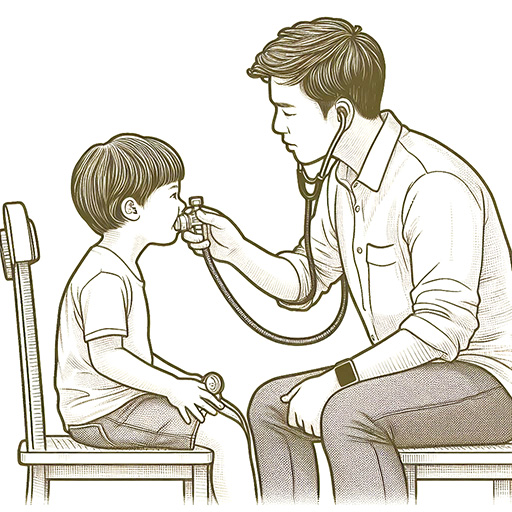Spirometry for Children

A child Spirometry is a common procedure used to assess lung function and diagnose conditions such as asthma, cystic fibrosis, and other respiratory disorders. Here’s what you can generally expect:
Before the Appointment
You will receive specific instructions beforehand, such as avoiding certain medications or strenuous activities that could affect the test results.
Ensure your child wears comfortable clothing that doesn’t restrict breathing. It may also be helpful to explain to your child in a simple and reassuring way what is happening to reduce anxiety.
What is Spirometry?
Spirometry is a simple and non-invasive test that measures how well your child can move air in and out of their lungs. It’s one of the most common and useful lung function tests for children, especially when assessing symptoms like coughing, wheezing, or shortness of breath.
Why is spirometry used in Children?
Spirometry is often used to:
- Diagnose asthma or other breathing conditions
- Monitor existing lung conditions, such as asthma, post-viral wheeze, or bronchitis
- Assess response to inhaler treatments
- Help decide if additional testing or a referral to a specialist is needed
How does the test work?
Your child will be asked to:
- Take a deep breath in
- Seal their lips tightly around a mouthpiece
- Blow out as hard and fast as possible until their lungs feel empty
This process is usually repeated at least three times to ensure accurate results. The test is safe and painless but requires cooperation and effort.
For younger children (typically aged 5 and up), we use child-friendly explanations, encouragement, and sometimes computer animations or games on the screen to help them blow correctly and stay motivated.
What does spirometry measure?
Key results from spirometry include:
- FEV1(Forced Expiratory Volume in one second): how much air your child can blow out in one second — often reduced in asthma
- FVC (Forced Vital Capacity): the total amount of air your child can exhale
- FEV1/FVC ratio: used to detect airway obstruction
In some cases, a reversibility test is also done. This means your child will use a reliever inhaler (like salbutamol), wait about 15 minutes, and then repeat the test to see if their breathing improves — which can help confirm an asthma diagnosis.
Is it suitable for all children?
Most children aged 5 years and above can perform spirometry reliably. For younger children or those unable to perform spirometry, alternative assessments may be considered, such as oscillometry or symptom-based evaluations.
What can parents expect?
- The test takes around 30–45 minutes.
- You can stay with your child throughout the test for reassurance
If your child is already on treatment (such as inhalers), the test may be used to assess how well it’s working or whether any changes are needed.
What can parents expect?
- Let your child know the test is painless and quick
- Bring any inhalers your child is using
- Professor Gupta may advise whether to pause asthma medication before the test – please follow those instructions
- Make sure your child avoids vigorous exercise or heavy meals just before the test
After the Appointment
Results Discussion
We’ll talk through your child’s lung test results at the follow-up appointment. It can take a little time to fully analyse everything, but we’ll go over the results with you during the consultation
Follow-up Plan
Depending on the results, there may be a follow-up plan which could include additional tests, treatments or adjustments to any existing medication regimen.
Answering Questions
We will also answer any questions you might have about the test results or next steps.
Tips for a Successful Appointment
Remain calm: Staying calm and positive can help your child feel more relaxed and perform better in the test.
Practice: You can practise blowing out candles or similar activities at home to help your child get used to the idea of blowing out forcefully.
Comfort item: Bringing a favourite toy or comfort item can help your child feel more at ease.
Request a referral or book an appointment with Professor Gupta today.
Based in London | Expert Paediatric Respiratory Care | Infants to teens seen
